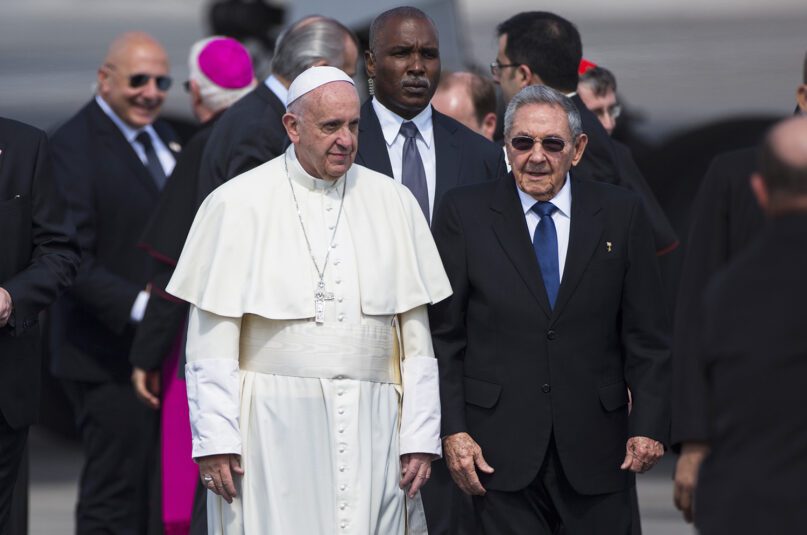(RNS) — For months, Pope Francis has dismissed reports that he plans to retire for the good of the church. His resignation cannot come soon enough for the people of Cuba.
“I love the Cuban people very much,” Francis said in an interview with TeleSur on July 12. “I also confess that I maintain a human relationship with Raúl Castro.”
His words come at a pivotal moment, as Cuba appears to teeter between democracy and its more than half-century-old status quo. Raúl Castro, who inherited the Communist regime in Havana from his brother Fidel, is a dictator whose strength is built on fear. It’s a fear felt viscerally by Cubans for decades, though recently that fear appears to be finally fading.
The pope also hailed Cuba as “a symbol,” as a country with “a great history.”
RELATED: EU Parliament urges Vatican to defend human rights in Hong Kong
These comments got little attention, as the global media was consumed at the time with those rumors of Francis’ resignation. But for the Cuban people, whose freedom has been forgotten throughout this “great history,” the comments served to reinforce the Castro regime’s legitimacy.
A different Catholic approach to the regime is embodied in Rosa María Payá, a 33-year-old, strikingly charismatic Catholic woman who has inherited a pedigree that is as proud as it is heavy.
She is the daughter of Oswaldo Payá, who, as a young hospital technician in 1986, called on the Catholic Church to stand up for freedom and advocate for the reinstatement of the people’s rights — to speak out, to assemble, to read and think as they pleased. His declaration came the same year the Cuban bishops held their first national gathering since the 1959 revolution that brought the Castros to power.
Instead, then-Archbishop of Havana, Cardinal Jaime Ortega, held secret meetings with Fidel Castro and embraced the regime.
Undeterred, Oswaldo Payá spent the ensuing years going door to door, gathering signatures to trigger a popular referendum on five proposals guaranteeing freedom of speech, freedom of association, electoral reforms, the right to own private businesses and amnesty for political prisoners. According to the Cuban constitution, 10,000 signatures are required; in 2002 Payá presented the national assembly with 11,020.
He knew these proposals were a symbolic gesture — but a powerful one. Payá called every signature “an act of liberation.”
The initiative was called the Varela Project, after the 19th-century Catholic priest, Félix Varela, who had fought for independence and the abolition of slavery in Cuba. For his advocacy, Varela was sentenced to death and was forced to flee to the United States.
The Varela Project caught the attention of former President Jimmy Carter, who visited Cuba and spoke about it during his remarks on Cuba’s state television station. Carter’s words fueled Payá’s movement, and he and his collaborators gathered thousands more signatures hidden from the ever-threatening regime by a clandestine network of nuns.
The movement also earned Payá international recognition, including the prestigious European Parliament’s Sakharov Prize for Freedom of Thought. Václav Havel, the former Czech dissident, befriended Payá and later nominated him for the Nobel Peace Prize.
As Payá’s international recognition grew, so did the Castro regime’s sense of vulnerability: This July 22 marks 10 years since Oswaldo Payá was killed in a mysterious car crash.
His daughter has picked up where her father left off. Today, from Florida, she leads a grassroots movement called Cuba Decide. In a country where communications are routinely cut off, they operate through underground channels.
In July 2021, Cubans rose up in the largest anti-government protests the country had seen in decades. The government’s response was swift. Peaceful demonstrators, including 17 minors, were subjected to arbitrary arrests, torture and draconian prison terms.
But the Cuban people remain defiant. A year later, the peaceful protests continue — as recently as July 14, hundreds of people came out to demand their freedom. In response, the government cut off the Internet. The next morning, authorities reportedly went door to door — not to collect signatures, as Oswaldo Payá did, but to round up protesters.
Against this backdrop, Rosa María Payá says the pope’s remarks pained her. His Holiness, she said, is leaving the Cuban people “defenseless.”
RELATED:
Pope Francis is not going to resign, yet
What the people need most desperately, she said, is the support of the international community. It is unthinkable, she said, to praise a history that is stained by the torture, imprisonment and killing of tens of thousands of faithful Catholics.
“The Cuban regime is a symbol, yes,” Payá said in a recent Instagram video. “A symbol of pride, of greed, a symbol of de-Christianization, a symbol of death.”
(Kristina Arriaga is a former member of the U.S. delegation to the United Nations Human Rights Commission and was vice chair of the U.S. Commission for International Religious Freedom. The views expressed in this commentary do not necessarily reflect those of Religion News Service.)





